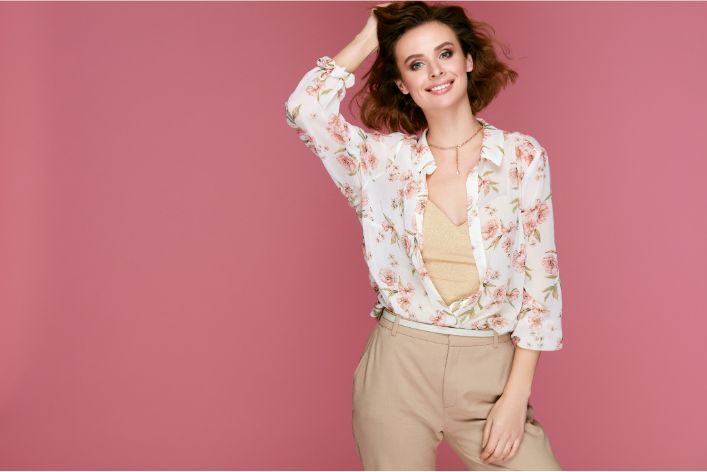Introduction
Let’s explore how luxury brands impact the fashion lifestyle.
Luxury brands are a staple in the fashion industry, representing high quality, exclusivity, and prestige.
These brands have a significant impact on the fashion lifestyle, influencing consumer behavior, and setting trends.
In this post, we will explore the significance of luxury brands in the fashion industry and their impact on the fashion lifestyle.
Luxury brands embody excellence, attention to detail, and superior craftsmanship, making them highly sought after in the fashion industry.
These brands are synonymous with exclusivity, with many offering limited edition collections, bespoke services, and personalized experiences.
Consumers who purchase luxury brands are often willing to pay a premium for the opportunity to own a quality item that is rare and unique.
In today’s fashion industry, luxury brands play a crucial role in setting trends and influencing consumer behavior.
Whether it’s through runway shows, celebrity endorsements, or social media marketing, luxury brands have the power to shape the fashion landscape.
Their influence can be seen in the way consumers dress, the products they purchase, and the styles they emulate.
Luxury brands are an integral part of the fashion industry, representing excellence, exclusivity, and prestige. Their impact on the fashion lifestyle is significant, setting trends and influencing consumer behavior.
As the fashion industry continues to evolve, we can only expect luxury brands to remain a key player in shaping the fashion landscape.
The Concept of Luxury Brands
Definition of luxury brands and their characteristics
Luxury brands are defined as high-end products that offer exceptional quality and exclusivity.
These brands are easily distinguishable from other brands due to their unique characteristics such as exquisite designs, premium quality materials, and superior craftsmanship.
Factors that contribute to a brand being considered ‘luxury’
A brand can be considered ‘luxury’ based on several factors.
Some of these factors include the brand’s reputation, its longevity and heritage, the exclusivity of its products, the quality of its materials, and the brand’s association with esteemed figures or celebrities.
Examples of highly successful luxury brands in the fashion industry
Louis Vuitton dominates as a top luxury brand globally due to its unique designs and superior craftsmanship.
Chanel, famous for timeless elegance, uses premium fabrics and meticulous attention to detail. Gucci, known for iconic designs, attracts discerning fashion enthusiasts with its quality and craftsmanship.
Other luxury giants like Prada, Dior, Burberry, and Saint Laurent uphold reputations for quality, uniqueness, and exclusivity.
Luxury brands not only set trends but also shape consumer behavior, influencing the broader fashion industry. Often imitated, these brands act as trendsetters.
They cultivate a culture of exclusivity and luxury, prompting consumers to pay premium prices for a luxurious lifestyle.
This trend fuels the fashion industry’s evolution, with luxury brands consistently raising the bar.
In essence, luxury brands stand out for their exceptional quality, exclusivity, and innovative designs. They symbolize the epitome of luxury, significantly impacting fashion trends and lifestyles.
Consumers aspiring to luxury willingly invest in these brands, perpetuating the culture of luxury and exclusivity.
Read: Is The Fashion Industry Classist?
The Fashion Lifestyle
A fashion lifestyle is an individual’s style of dressing, grooming, behaving, and living that is influenced by current fashion trends, personal taste, and societal expectations.
The fashion lifestyle has a significant impact on society because it reflects the cultural, economic, and social values that people uphold.
Luxury brands have played a significant role in shaping the fashion lifestyle. These brands are known for their high-quality products, prestige, and exclusivity.
Consumers associate luxury brands with status, power, and sophistication.
As a result, luxury brands have become an aspirational symbol for many people, and their impact on the fashion lifestyle is undeniable.
When it comes to fashion trends and styles, luxury brands are often at the forefront. Many luxury brands have established themselves as trendsetters, and their products dictate what is fashionable and desirable.
For example, the iconic Chanel tweed jacket has influenced fashion trends for decades and remains a staple in many fashion-conscious individuals’ wardrobes.
How luxury brands influence the fashion lifestyle
- Exclusivity: Luxury brands are known for their exclusivity, which makes their products desirable.
- Prestige: Luxury brands are associated with prestige and high social status, making them aspirational for many people.
- Quality: Luxury brands are often associated with high-quality products that people perceive as lasting longer and performing better than cheaper alternatives.
- Marketing: Luxury brands invest heavily in advertising and marketing to create a strong brand image, which reinforces their exclusivity and prestige.
- Celebrity endorsements: Luxury brands often partner with celebrities to promote their products, which can influence consumers’ perceptions and purchase decisions.
- Trendsetting: Many luxury brands are trendsetters, and their products can influence fashion trends and styles for years to come.
The impact of luxury brands on fashion trends and styles
- Innovation: Luxury brands often introduce new materials, designs, and styles to the fashion industry, which can inspire other brands to follow suit.
- Timelessness: Luxury brands often produce timeless pieces that remain relevant and desirable for many years.
- Cultural influence: Luxury brands can influence fashion trends and styles in different regions and cultures worldwide.
- Perceived value: Luxury brands often charge a premium price for their products, which creates a perception of high value and quality in consumers’ minds.
- Consumer behavior: The aspirational nature of luxury brands can influence consumer behavior, causing them to purchase products they perceive as valuable and exclusive.
- Economic impact: The luxury fashion industry contributes significantly to the global economy, providing jobs and generating revenue.
Overall, luxury brands have had a substantial impact on the fashion lifestyle. They have influenced fashion trends and styles, shaped consumer behavior, and contributed to the global economy.
The aspirational nature of luxury brands and their association with prestige, exclusivity, and quality will continue to shape the fashion lifestyle for years to come.
Read: How to Create a Personal Brand on Instagram
We Design & Develop Websites, Android & iOS Apps
Looking to transform your digital presence? We specialize in creating stunning websites and powerful mobile apps for Android and iOS. Let us bring your vision to life with innovative, tailored solutions!
Get Started TodayThe Impact of Luxury Brands
Luxury brands have taken the fashion industry by storm, and with good reason.
They not only offer high-end dresses, shoes, and bags, but they also provide a sense of prestige and social status to the consumers who buy them.
This section will explore the impact of luxury brands on consumer behavior, the psychology behind purchasing luxury products, and the effect of luxury brands on social status and prestige.
Analyzing the Impact of Luxury Brands on Consumer Behavior
Consumer behavior plays a vital role in the success of luxury brands.
Consumers purchase luxury products for a variety of reasons, including the quality of the product, brand reputation, and the perception of owning something exclusive.
Luxury brands have a unique appeal that attracts consumers who are willing to pay a premium price for an item.
Moreover, luxury brands have the power to evoke emotions and enhance self-esteem in consumers. Owning a luxury product can make an individual feel special, unique, and part of a select group.
Therefore, luxury brands use marketing tactics such as celebrity endorsements, exclusive events, and limited edition collections to create a sense of exclusivity that appeals to their target audience.
The Psychology Behind Purchasing Luxury Products
The psychology behind purchasing luxury products involves the unique psychological needs of consumers that are fulfilled by owning luxury goods.
The psychological factors involved in purchasing luxury products are status, self-esteem, and individuality.
In terms of status, luxury brands represent a higher social class and can provide a sense of belonging to a particular social group.
Consumers purchase luxury products to elevate their social status and to differentiate themselves from others.
Therefore, owning a luxury product becomes a symbol of social status that enhances the consumer’s perceived value and worth to those around them.
Self-esteem is another major factor that drives consumers to purchase luxury products.
The sense of achievement and pride that comes with owning a luxury item can significantly boost the buyer’s self-esteem.
Moreover, luxury items are believed to signify high levels of quality and superior design, which promotes the sense of pride that comes with owning something extraordinary.
Individuality is another vital psychological factor that drives luxury spending. Consumers want to feel unique and different from the crowd.
Luxury brands provide exclusivity, uniqueness, and a sense of individuality that regular brands cannot, making owning a luxury item an essential component of self-expression.
The Effect of Luxury Brands on Social Status and Prestige
Luxury brands have a significant impact on social status and prestige.
They represent wealth, sophistication, and exclusivity, which enhances the consumer’s level of social status and prestige within their community or group.
Moreover, luxury brands provide a sense of belonging to a particular social group.
For instance, owning a Louis Vuitton handbag not only indicates that the person bought a quality product; they also belong to an exclusive group of people who can afford luxury items.
Therefore, owning luxury brands benefits an individual’s position in society and grants them acceptance within their social circle.
In essence, luxury brands have taken the fashion industry by storm. They are here to stay, and their influence on consumer behavior, psychology, social status, and prestige continues to grow.
Ultimately, luxury brands offer more than just quality products; they provide a sense of belonging, prestige, and exclusivity that satisfies psychological needs and enhances the consumer’s self-esteem.
Read: The Role of Social Media in Personal Branding

The Future of Luxury Brands
The luxury fashion industry is constantly evolving, with trends and consumer preferences changing on a regular basis.
Brands must keep up with these changes to remain relevant and successful in the market. This section will explore some of the trends and forecasting for the future of luxury brands.
Trends in the Luxury Fashion Industry
- Increased focus on sustainability and ethical practices in production
- Greater use of technology to enhance the customer experience, such as AI and AR
- Shift towards experiential marketing to create unique brand experiences for customers
- Increased interest in customization and personalization of products for individual customers
- Collaborations between luxury brands and other industries, such as art and music
- Greater emphasis on diversity and inclusivity in advertising campaigns and brand messaging
These trends shape the direction of the luxury fashion industry and guide brands in adapting to the changing market.
For instance, many brands are incorporating sustainable practices in their production processes to appeal to eco-conscious consumers.
Forecasting Future Growth and Success in the Industry
The luxury fashion industry is projected to grow in the coming years, with estimates showing a compound annual growth rate of 4.5% from 2020 to 2027.
This growth is due in part to the rising purchasing power of the middle class in emerging economies.
Another factor driving growth is the increasing demand for luxury goods among millennials and Gen Z consumers.
These younger consumers value experiences over material possessions and are seeking out unique, high-quality products that reflect their personal values and style.
However, brands must navigate challenges to sustain their growth and success. One issue is the rise of counterfeit products, which can damage a brand’s reputation and sales.
We Design & Develop Websites, Android & iOS Apps
Looking to transform your digital presence? We specialize in creating stunning websites and powerful mobile apps for Android and iOS. Let us bring your vision to life with innovative, tailored solutions!
Get Started TodayAnother challenge is the need to balance exclusivity with accessibility, as brands strive to maintain their luxury status while expanding their customer base.
The Potential Consequences of Luxury Brands for Society and the Economy
While luxury brands contribute to the global economy through job creation and tourism, there are also potential consequences to their impact on society.
One concern is the rise of a culture of excess and materialism, fueled by the desire for luxury goods and the pressure to keep up with trends.
Another consequence is the issue of social inequality, as luxury brands cater primarily to wealthy consumers and may neglect the needs and values of lower-income individuals and communities.
Additionally, the environmental impact of luxury fashion production can be significant, as many brands use non-renewable resources and contribute to waste and pollution.
As luxury brands continue to grow and evolve, it is important for them to consider the potential consequences of their actions and prioritize sustainability, inclusivity, and ethical practices.
Read: Understanding the Different Social Networking Platforms
Conclusion
The future of luxury brands is shaped by trends in the industry, projections for growth and success, and potential consequences for society and the economy.
While there are challenges and risks to navigate, the luxury fashion industry offers opportunities for innovation, creativity, and positive impact.
By prioritizing sustainability, inclusivity, and ethical practices, brands can remain relevant and successful while contributing to a more responsible and equitable global economy.
Before you go…
Hey, thank you for reading this blog to the end. I hope it was helpful. Let me tell you a little bit about Nicholas Idoko Technologies.
We help businesses and companies build an online presence by developing web, mobile, desktop, and blockchain applications.
We also help aspiring software developers and programmers learn the skills they need to have a successful career.
Take your first step to becoming a programming boss by joining our Learn To Code academy today!
Be sure to contact us if you need more information or have any questions! We are readily available.
Put Your Tech Company on the Map!
Get featured on Nicholas Idoko’s Blog for just $200. Showcase your business, boost credibility, and reach a growing audience eager for tech solutions.
Publish Now










